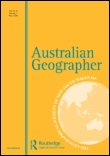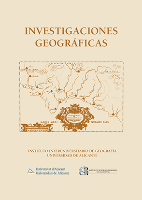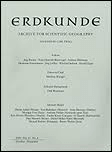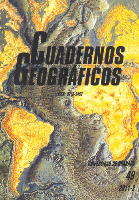
GEOGRAFICKY CASOPIS-Geographical Journal
Scope & Guideline
Unveiling the complexities of our planet, one study at a time.
Introduction
Aims and Scopes
- Regional Development and Planning:
The journal emphasizes studies on regional development, including cross-border cooperation, urban planning, and the socio-economic dynamics of regions, particularly in Slovakia and Czechia. - Environmental Geography and Sustainability:
Research related to environmental issues, including land cover changes, natural capital assessments, and sustainability in various contexts, forms a significant part of the journal's scope. - Cultural and Historical Geography:
The journal publishes works that delve into the cultural landscapes, historical transformations, and heritage conservation, highlighting the interplay between culture and geography. - Methodological Innovations in Geographical Research:
There is a consistent focus on employing advanced methodologies, such as GIS and remote sensing, to address geographical questions and enhance spatial analysis. - Social Geography and Demographic Studies:
The journal explores themes related to social structures, demographic changes, and public health, reflecting the journal's engagement with contemporary societal issues.
Trending and Emerging
- Climate Change and Environmental Impact Studies:
There is a notable increase in research addressing climate change, its impacts on regions, and strategies for mitigation, indicating a growing recognition of environmental challenges. - Urban Resilience and Revitalization:
Themes surrounding urban revitalization, particularly in distressed areas, have gained prominence, reflecting an interest in sustainable urban development and community resilience. - Spatial Vulnerability and Accessibility Analysis:
Recent publications have increasingly focused on spatial vulnerability, accessibility issues, and how these factors affect quality of life and socio-economic conditions, highlighting a trend towards more nuanced socio-spatial analyses. - Ecosystem Services and Biodiversity:
The assessment of ecosystem services and biodiversity has emerged as a critical area of focus, underscoring the journal's commitment to exploring the intersection of ecology and geography. - Public Health and Well-being in Geographical Contexts:
Research examining public health issues, particularly as influenced by geographical factors, has become more prominent, reflecting the journal's engagement with contemporary health challenges.
Declining or Waning
- Historical Geography Studies:
Although historical geography has been a part of the journal's offerings, recent publications suggest a decrease in studies explicitly focused on historical transformations and methodologies, potentially overshadowed by contemporary societal issues. - Tourism Geography:
Research specifically centered on tourism geography, while still present, appears to be less frequent, possibly due to a broader focus on sustainability and environmental impacts rather than tourism as an isolated subject. - Traditional Agricultural Practices:
The exploration of traditional agricultural landscapes and practices has waned, indicating a possible shift towards more modern agricultural issues and sustainability challenges.
Similar Journals

AUSTRALIAN GEOGRAPHER
Shaping the Future of Earth-Surface ResearchAUSTRALIAN GEOGRAPHER, published by Routledge Journals, Taylor & Francis Ltd, is a leading scholarly journal that captures the dynamic and multifaceted field of geography. With an ISSN of 0004-9182 and an E-ISSN of 1465-3311, this peer-reviewed journal has a long-standing tradition, dating back to its origins between 1928 and 1929, and is essential for those engaged in cutting-edge research in Earth-Surface Processes and Geography, Planning and Development. Recognized for its academic rigor, the journal holds a prestigious Q1 ranking in both Earth-Surface Processes and Geography categories as of 2023. Furthermore, its Scopus rankings underscore its influence, placing it in the top 30% of its field. Although it does not currently offer Open Access, AUSTRALIAN GEOGRAPHER remains a critical platform for presenting significant geographic research and fostering academic dialogue, making it indispensable for researchers, professionals, and students eager to contribute to the evolving landscape of geographic scholarship.

Geoadria
Bridging Disciplines for a Sustainable FutureGeoadria, an esteemed Open Access journal published by the University of Zadar in Croatia, has been at the forefront of disseminating valuable research since its inception in 1996. With a keen focus on atmospheric science, demography, earth-surface processes, and geography, this journal serves as a crucial platform for researchers and professionals aiming to explore the intricate relationships between these fields. Although it currently holds a Q4 quartile ranking in various categories, such as Atmospheric Science and Geography, its commitment to promoting innovative scholarly dialogue ensures its relevance and utility within the academic community. Geoadria is indexed in Scopus, with rankings that reflect its ongoing contribution to the social sciences and earth sciences, notably garnering attention in niche areas. With a dedication to open access since 1996, the journal stands as a testament to the University of Zadar's commitment to enhancing global knowledge. Researchers, professionals, and students interested in geography, demography, and environmental sciences will find Geoadria a vital resource for the latest empirical studies and theoretical discussions.

Hrvatski Geografski Glasnik-Croatian Geographical Bulletin
Unveiling Insights into Our Changing WorldHrvatski Geografski Glasnik-Croatian Geographical Bulletin, ISSN 1331-5854, E-ISSN 1848-6401, is an esteemed open-access journal published by the Croatian Geographical Society that has been serving the geography community since 1929. Based in Zagreb, Croatia, this journal focuses on a broad spectrum of geographical research, providing a platform for the dissemination of original articles, reviews, and case studies that contribute to the understanding of earth-surface processes and development planning. Although it currently holds Q4 rankings in both Earth-Surface Processes and Geography, Planning and Development, the journal is dedicated to enhancing its impact within the scientific community, aspiring to elevate research visibility and collaborative opportunities. With a commitment to open access, it ensures that all content is readily available to researchers, professionals, and students worldwide, fostering an inclusive environment for geographical scholarship. Engaging with this journal presents an opportunity to stay updated with emerging trends and pivotal studies within the discipline throughout its converged years from 1998 to 2024, making it a vital resource in geography and related fields.

Boletin Goiano de Geografia
Connecting Scholars for a Sustainable FutureBoletin Goiano de Geografia is a distinguished academic journal dedicated to the field of Geography, published by the Universidade Federal de Goiás, Instituto de Estudos Socio-Ambientais. Since its inception in 1981, this Open Access journal has provided invaluable insights into the geographical dynamics of Brazil and beyond, promoting scholarly research and dialogue among geographers, environmentalists, and social scientists. The journal seeks to advance knowledge through the dissemination of research articles, reviews, and case studies that address contemporary issues in human and physical geography. With a commitment to fostering interdisciplinary collaboration, Boletin Goiano de Geografia serves as a vital resource for researchers, professionals, and students seeking to explore the complex interactions between society and the environment. Situated in the vibrant academic landscape of Goiana, Brazil, this journal enhances the global discourse on geographical studies and sustainability.

Miscellanea Geographica
Connecting Research with Real-World ImpactMiscellanea Geographica, published by SCIENDO, is a prominent open-access journal established in Germany that contributes significantly to the fields of Earth and Planetary Sciences and Geography. With an ISSN of 0867-6046 and an E-ISSN of 2084-6118, this journal has been a platform for scholarly dissemination since 1984, encompassing a diverse range of interdisciplinary research areas. Since transitioning to open access in 2011, it has made its content widely available, enhancing visibility for researchers and practitioners across the globe. In the 2023 category quartiles, Miscellanea Geographica is ranked Q3 in both Earth and Planetary Sciences (miscellaneous) and Geography, Planning and Development, reflecting its commitment to quality scholarship. This journal is specifically designed to foster dialogue and collaboration among researchers, professionals, and students, making it a vital resource for those invested in the intricate relationships between geography and societal development. Researchers are encouraged to contribute groundbreaking studies that not only advance academic understanding but also address real-world challenges.

Investigaciones Geograficas-Spain
Fostering collaboration in earth and planetary sciences.Investigaciones Geográficas-Spain is an esteemed academic journal published by the Universidad de Alicante, dedicated to advancing the fields of geography, planning, and development as well as earth and planetary sciences. With its commitment to open access since 1983, the journal ensures that research is readily available to a global audience, facilitating knowledge dissemination and collaborative discourse. As reflected in its 2023 Scopus rankings, it holds a commendable position within the Q3 category in both Earth and Planetary Sciences and Geography, Planning and Development, making it a noteworthy resource for scholars and practitioners in these disciplines. The journal's scope encompasses diverse geographical research, aiming to address pressing environmental and societal challenges through empirical studies and theoretical advancements. By contributing to the knowledge reservoir from Spain and beyond, Investigaciones Geográficas-Spain serves as a vital platform for researchers, professionals, and students seeking to enrich their understanding of geographical phenomena.

Erdkunde
Bridging Theory and Application in Environmental StudiesErdkunde is a pivotal academic journal published by the Geographisches Institut, University of Bonn, dedicated to the fields of Geography, Earth and Planetary Sciences, and Ecology. With a history dating back to 1976, this journal serves as a platform for interdisciplinary research and discourse, reflecting diverse perspectives from both theoretical and applied dimensions within these domains. Published in Germany, it currently holds a respectable position within the academic community, classified in Q2 for Geography, Planning and Development and Q3 in Ecology and Earth and Planetary Sciences. Although not an open-access journal, its contribution is significant, offering insights that advance our understanding of spatial dynamics and environmental processes. With Scopus rankings that place it within the median range, Erdkunde is an essential resource for researchers, professionals, and students looking to deepen their knowledge and engage with contemporary trends in geographic research.

Cuadernos Geograficos
Unlocking insights into our dynamic earth-surface processes.Cuadernos Geograficos is a distinguished open access journal published by UNIV GRANADA in Spain, dedicated to advancing the fields of geography, planning, and earth-surface processes. With an ISSN of 0210-5462 and E-ISSN 2340-0129, this journal has been serving as an essential platform for scholars since its inception in 1983. By providing rigorous peer-reviewed research, Cuadernos Geograficos contributes significantly to the academic discourse within these disciplines, holding a respectable position in the Q3 category for both Earth-Surface Processes and Geography, Planning, and Development as of 2023. The journal is indexed in Scopus, ranking #431/821 in Social Sciences and #100/179 in Earth and Planetary Sciences, affirming its relevance and impact within the scholarly community. With its commitment to open access since 1999, Cuadernos Geograficos ensures that vital research is accessible to a diverse audience of researchers, professionals, and students, fostering knowledge sharing and collaborative advancements in the geographical sciences.

Geographia Polonica
Charting New Territories in Geographic ResearchGeographia Polonica is a premier academic journal published by the Polish Academy of Sciences, Institute of Geography and Spatial Organization, renowned for its contributions to the field of geography and related disciplines. With a history spanning from 1972, it has evolved into a vital resource for researchers and professionals, addressing a wide spectrum of topics from cultural studies to urban planning and development. Geographia Polonica is indexed with impressive rankings in various categories, including a Q1 classification in Cultural Studies and significant positions in Earth and Planetary Sciences and Urban Studies, reflecting its influence and recognition in these critical areas. Although it operates under a traditional subscription model, its commitment to high-quality, peer-reviewed research ensures that the latest findings and advancements are accessible to the academic community. With its rich archival content and contemporary insights, Geographia Polonica serves as an essential platform for scholarly dialogue, making it an invaluable reference for students, researchers, and professionals eager to explore the complexities of spatial organization and geographical phenomena in a global context.

Revista Geografica de America Central
Empowering Research for a Sustainable Central America.Revista Geografica de America Central is a distinguished scholarly journal published by the UNIV NACL, ESCUELA CIENCIAS GEOGRAFICAS, focusing on the dynamic field of geography, particularly within Central America. Since its inception in 1974, the journal has championed the dissemination of open-access research, fostering collaboration and innovation among researchers, professionals, and students alike. With an evolving scope that reflects the region's rich geographical diversity, this journal serves as a vital platform for sharing empirical studies, theoretical advancements, and methodological discussions that enhance our understanding of Central America's unique environmental and socio-economic challenges. Although it has experienced various coverage periods, the journal remains committed to advancing geographic scholarship and supporting open academic discourse. Its open-access model ensures that essential knowledge is readily available to an expanding global audience, making it an invaluable resource in the field.